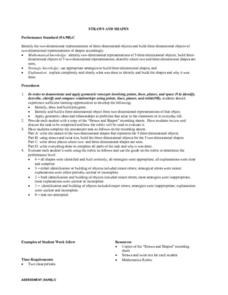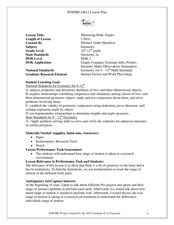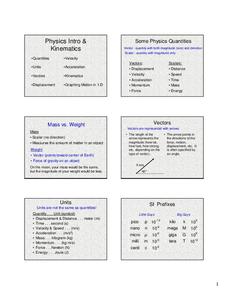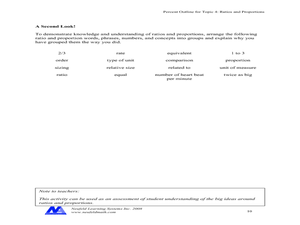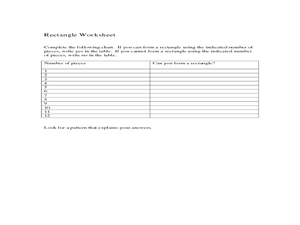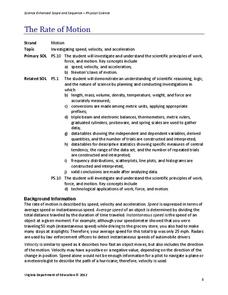National Park Service
The Power of Remembrance
On every July 4th, we watch fireworks and celebrate our independence, but how is the history of the American Revolution preserved? Four social studies lesson guide learners through different memorials, commemorative objects, and restored...
Curated OER
Faces of a Cube
Students identify and correctly name three-dimensional solids; cones, spheres, and cubes. In this three-dimensional figures lesson, students build a cube by matching colored square faces to a correct word. Students then...
Curated OER
Straws and Shapes
Students investigate the concepts related to observing two dimensional objects. They also build three dimensional objects using the two dimensional objects. The students give an oral or written explanation for how the pieces fit together...
Curated OER
Surface Area of Cubes and Rectangular Prisms
Eighth graders calculate surface area of 3-D shapes. In this geometry lesson, 8th graders analyze cubes and prisms by finding their area and surface area. They compare the data of these two shapes.
Curated OER
Building a Native American Home
First graders explore different types of Native American shelters. In this Native American homes lesson, 1st graders compare the shapes of shelters used by Native Americans. They build a home using the program "Community Construction...
Curated OER
Music in the Common Schools
Young scholars sing songs from the common schools era and compare music from the common schools era and today. In this music lesson plan, students look at pictures, fill out Venn Diagrams, and listen to music.
Curated OER
Measuring Body Angles
Learners use technology to graph and compare angles. In this geometry lesson, students range of motion in the environment. They identify the missing parts of polygons using similarity and congruence.
American Chemical Society
Finding Volume: The Water Displacement Method
We have formulas for finding the volume of geometric shapes, but what if the shape is irregular? Lesson describes how to find volume through water displacement. After a demonstration, scholars practice in small groups. Then analysis...
Mr. Hill's Science Website
Density Workbook
It's all about density! Here's a dense workbook for young scientists; they solve (and show work for) 29 density word problems, including a problem where they solve for the density of Godzilla. They complete labs analyzing metal...
Waterloo Mathematics
Number Sense and Numeration: Ratio and Rate
Seventh-graders solve 20 various types of problems related to ratio and rate. They write ratios in simplest form for each given statement, to compare the area of two figures, and write two ratios equivalent to each ratio. Pupils express...
media.yurisnight.net
Science Lesson Plan: Our Solar System: I Wonder?
Ever wonder why Pluto isn't considered a planet? Or how large the Earth is compared to the other inner planets? Explore the universe with a series of projects that simulate different aspects of our solar system. The activities require...
Illustrative Mathematics
Tossing Cylinders
Everyone loves a lesson that involves throwing things around! To understand probability, your experimenters will predict how different cylinder-shaped objects will land when tossed. When the data is collected, they will calculate the...
Curated OER
Iron For Breakfast
Third graders are challenged to use scientific thinking, they experiment and observe which objects are attracted to a magnet. Pupils use the evidence to construct an explanation as to what common property the objects attracted to a...
Urbana School District
Physics Intro, Kinematics, Graphing
Some consider physics the branch of science concerned with using long and complicated formulas to describe how a ball rolls. This presentation, while long, is not complicated, yet it covers rolling, falling, and more. It compares vectors...
Neufeld Learning Systems
Concept: Ratios and Proportions
Upper elementary and middle school pupils fill out a chart creating six equivalent fractions and then compare them to six different objects and/or shapes. They group together 16 various terms related to ratios and proportions. Pupils...
Curated OER
Area, Perimeter and Rations Using Pentominoes
Learners of all ages investigate area and perimeter through pentominoes. In this geometry activity, students calculate the are and perimeter of different geometric shapes and describe the properties of similar and congruent shapes. This...
Virginia Department of Education
The Rate of Motion
How much time does it take to jump over three balloons? Pupils calculate the speed of tasks that require different motions. They determine motions for tasks such as walking, skipping, hopping, and jumping before creating a...
Wordpress
Introduction to Exponential Functions
This lesson begins with a review of linear functions and segues nicely over its fifteen examples and problems into a deep study of exponential functions. Linear and exponential growth are compared in an investment task. Data tables are...
Inside Mathematics
Quadratic (2009)
Functions require an input in order to get an output, which explains why the answer always has at least two parts. After only three multi-part questions, the teacher can analyze pupils' strengths and weaknesses when it comes to...
Curated OER
Introduction to Myths, Fables, and Legends
Middle schoolers identify elements of myths, fables, and legends as they read an example of each. After reading an example of each type of story, they list elements from each. They compare and contrast these features by...
Curated OER
Temperature
Several slides compare different temperature scales. Thermal expansion, heat transfer, and Maxwell speed distribution are also explored. The last two slides seem unrelated to the topic of heat, but are easily left out of this otherwise...
Curated OER
From Rags to (Paper) Riches: Explore Colonial Papermaking
Students explore Colonial papermaking. In this Colonial America U.S. history lesson, students analyze two poems written in the 1690s about the Rittenhouse paper mill to learn about papermaking. Students produce their own...
DK Publishing
Big, Bigger, Biggest
Which water creature is the biggest? Youngsters look at an image of a big shell, then draw a bigger shell next to it. They do the same for a big fish. Next, learners practice with the superlative as they circle the biggest duck and frog....
Futures Channel
Folding Circles
Students investigate properties of circles. In this geometry activity, students differentiate between similarity and congruence as they observe polygons. They investigate properties of two and three dimensional shape.


